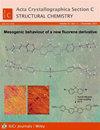(+ -)酒石的酸。
IF 0.8
4区 化学
Acta crystallographica. Section C, Crystal structure communications
Pub Date : 2020-02-07
DOI:10.1021/cen-v037n017.p078
引用次数: 14
摘要
(+-)-酒石酸,C(4)H(6)O(6),由乙醇在空间群p1宏中结晶。该结构的特征是五个氢键,包括形成一个中心对称的羧酸二聚体,沿体对角线形成无限链。这些链通过α -羟基之间的氢键形成薄片。这些薄片通过一个分叉的氢键连接起来。与同手性(2R,3R)-(+)-酒石酸进行了结构比较。本文章由计算机程序翻译,如有差异,请以英文原文为准。
(+-)-Tartaric acid.
(+-)-Tartaric acid, C(4)H(6)O(6), crystallized from ethanol in space group P 1 macro. The structure is characterized by five hydrogen bonds, including the formation of a centrosymmetric carboxylic acid dimer which forms infinite chains along the body diagonal. These chains form sheets via hydrogen bonding between alpha-hydroxyl groups. The sheets are connected through a bifurcated hydrogen bond. Structural comparisons are made with homochiral (2R,3R)-(+)-tartaric acid.
求助全文
通过发布文献求助,成功后即可免费获取论文全文。
去求助
来源期刊
自引率
12.50%
发文量
0
审稿时长
1 months
期刊介绍:
Acta Crystallographica Section C: Structural Chemistry is continuing its transition to a journal that publishes exciting science with structural content, in particular, important results relating to the chemical sciences. Section C is the journal of choice for the rapid publication of articles that highlight interesting research facilitated by the determination, calculation or analysis of structures of any type, other than macromolecular structures. Articles that emphasize the science and the outcomes that were enabled by the study are particularly welcomed. Authors are encouraged to include mainstream science in their papers, thereby producing manuscripts that are substantial scientific well-rounded contributions that appeal to a broad community of readers and increase the profile of the authors.

 求助内容:
求助内容: 应助结果提醒方式:
应助结果提醒方式:


